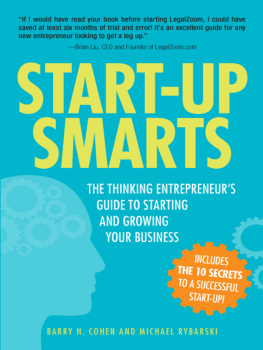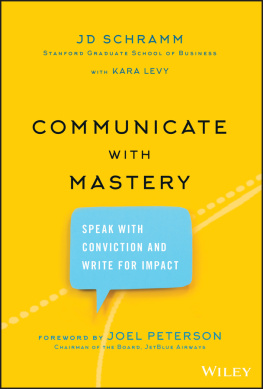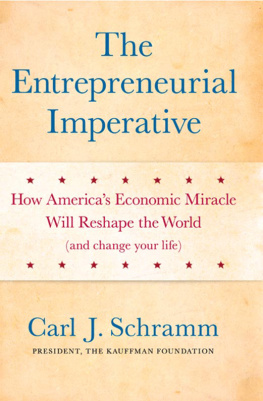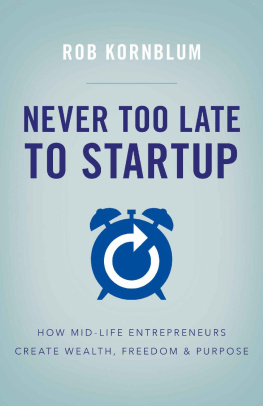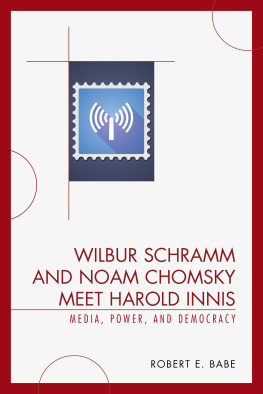Thank you for downloading this Simon & Schuster ebook.
Get a FREE ebook when you join our mailing list. Plus, get updates on new releases, deals, recommended reads, and more from Simon & Schuster. Click below to sign up and see terms and conditions.
CLICK HERE TO SIGN UP
Already a subscriber? Provide your email again so we can register this ebook and send you more of what you like to read. You will continue to receive exclusive offers in your inbox.
We hope you enjoyed reading this Simon & Schuster ebook.
Get a FREE ebook when you join our mailing list. Plus, get updates on new releases, deals, recommended reads, and more from Simon & Schuster. Click below to sign up and see terms and conditions.
CLICK HERE TO SIGN UP
Already a subscriber? Provide your email again so we can register this ebook and send you more of what you like to read. You will continue to receive exclusive offers in your inbox.
In memory of Ewing Marion Kauffman.
A great American entrepreneur who started his company without a college education, a written business plan, an incubator experience, a mentor, or a venture investor. He was committed to the idea that more people should, Make a job, not take a job, and devoted his fortune to helping others see that entrepreneurship is a choice that anyone can make. Like so many great Americans, Ewing Kauffman saw his lifes story as emblematic of how a regular person from humble beginnings could achieve success through personal initiative and hard work in a free nation that encouraged individuals to find, develop, and apply their creative talents in business. The Kauffman Foundation has embodied his magnificent choice to give back by lighting the path for those willing to take the personal risk of starting businesses that make life better for others. Thank you, Mr. K.
Preface
How can real, practical information help potential entrepreneurs? I have started companies, managed small and large entities, been a venture investor, consulted with big firms and governments on innovation, and spent time as a professor. For ten years, I was privileged to run the Kauffman Foundation, the Foundation of Entrepreneurship in Kansas City. Along the way, I was lucky enough to spend time with many successful entrepreneurs, aspiring entrepreneurs, investors, and business visionaries.
These experiences made me realize that many of the popularly held ideas about how, when, and why people start companies probably are wrong. As an economist, I began to look skeptically at the powerful underlying memesthe largely unexamined but widely accepted ideas that shape our view of the worldespecially those applicable to new business success. The entrepreneurship memes seemed to be little more than an assortment of stories and case histories that had crystallized into a rubric.
So, in 2002, I embraced the opportunity to direct the Kauffman Foundation. The Foundation was a nearly $2 billion endowment established by Ewing Marion Kauffman, an innovative Kansas City pharmaceutical company founder, and was the worlds largest philanthropy dedicated to promoting entrepreneurship. This was an irresistible challenge: I knew that a continuing stream of new businesses was critical to societys growth and advancement, and that what entrepreneurs really do is too important to be described by glittering narratives that are not based on evidence. After all, innovative businesses bring us unimagined products and services, create most of the new jobs in our economy, and are the most important force driving growth and creating expanding welfare. Entrepreneurs are too valuable a national resource to be subjected to a potpourri of unsubstantiated aphorisms dressed up as good business advice.
The Kauffman Foundation provided the platform to recruit a small army of brilliant economists to initiate serious research on how new businesses really get started and grow. The team extended the work of Joseph Schumpeter two influential economists who had examined entrepreneurship well before almost anyone knew how to spell it, much less what it meant. Research inside Kauffman and scholarship supported by the Foundation produced a torrent of empirical research on entrepreneurs, which resulted in insights that people now seem to think that weve always known. For example, it was not previously well understood that young firms create more than eighty percent of all new jobs in our economy, or that new business formation plays such a significant role in economic expansion. Now, happily, entrepreneurship is embedded in every discussion about economic growth. The Kauffman team was the first to inject intellectual, empirical rigor into research about how new firms are created. Because of this work, we know much more about how businesses are formed and how they grow and what is likely to improve your chances for success.
This book seeks to translate many of these findings, and the experiences of some of the thousands of entrepreneurs whom Ive met, into practical guidance and lessons. It is intended to illustrate how businesses really start, grow, and prosper. The first four chapters speak to the what of business startups, the following four to lessons learned by those who have gone before you, and the last section is devoted to data-derived facts, not myths, and realistic guidance from successful entrepreneurs.
CHAPTER 1
Burn the Business Plan
One of the headwinds that challenges a fact-based discussion of successful entrepreneurship is the looming presence of a handful of wildly successful high-tech innovators. The icons are, of course, the household names: Bill Gates, Steve Jobs, and Mark Zuckerberg, the myth-making college dropouts who became billionaires before thirty. While their stories make fascinating reading, and we owe them immeasurable gratitude for their revolutionary contributions, their narratives hold very few actionable lessons for the more than ninety-five percent of entrepreneurs who want to start a construction business, manufacture innovative building materials, become a service provider, or develop a franchise. These are the people more like you and me, from all walks of life, who want to start businesses.
In fact, the romanticized narrative of the young, mostly male, high-tech wizard accounts for the smallest constellation in the universe of entrepreneursonly about five to seven percent. Their new businesses get almost all the high-profile investment by venture capital firms, most of the media coverage, andheres a surpriseexperience the highest failure rate of business startups. About eight in ten disappear within five years.
The real story on startups and their success rates reveals something very different. Most entrepreneurs never went to college, and most did not start their companies until they were well along in their careers. The average entrepreneur is nearly forty years old when he launches, and more than eighty percent of all new companies are started by people over thirty-five. More entrepreneurs are between forty-five and fifty-five than any other cohort, and entrepreneurs over fifty-five now create more companies than those under thirty-five. Andanother surprisethe chances of a new company surviving rises with the age of the entrepreneur.
Recognizing that the mature entrepreneur is a significant element in the startup world also leads us to acknowledge the influence of working for someone else before you start your own company. The average entrepreneur was an employee for almost fifteen years before launching a startup. Although it may seem counterintuitive, a big company can operate as a de facto school in which you can learn how toand sometimes how not totest, manufacture, price, and sell products; organize a workforce and deal with suppliers; finance equipment and facilities; and comply with legal and regulatory requirements. Research also tells us that a significant number of innovative entrepreneurs have launched out of large companies that didnt want to diversify to invest in what they saw as a tangent to their core businesses. Some established companies even have signed over ownership of innovative ideas to employees and sent them off with good wishes for success.
Next page

